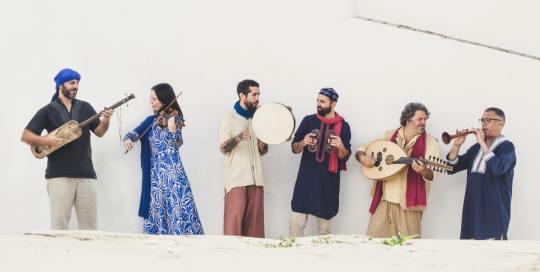|
The third album of the Andalusian sextet La Banda Morisca retains much of the flavour of the group’s first two discs, while moving the band’s sound forward into new territory. Informed by the traditions of old Al-Andaluz, the longest-Islamicized region of Spain which also maintained long standing ties with the Middle East,the Maghreb and other parts of the Mediterrranean and Africa, their new disc is quite well polished for a world music audience. While the Arabic influences on Spanish music are obvious, La Banda Morisca makes the connection explicit, following on the success of Andalucia’s Radio Tarifa and such Valencian singers such as Miquel Gil and Carles Denia.
This disc has ten tracks and almost an hour of this wonderful folk-rock-flamenco fusion with the passionate, powerful flamenco voice of José Mari Cala a leading feature throughout. As Cala tells an ancient tale, you can follow it through the emotion in his voice, even if you can’t quite understand what’s going on in the lyrics.
The tracks tend to be a bit longer than on the previous discs, with more going on. Many of the ambitious six or seven- minute tracks are complex and involve changes in rhythms, melodies, and tempos but with a group that seems clearly in sych. This is world music with the architecture of progressive rock, in the best sense.
They’ve had some turnover in the cast since their formation and, while the fundamental idea remains the same, this lineup and the band’s expansive new sound, is very much a step forward from their very good debut and second efforts.
Incorporating the beautiful violin of Belén Lucena into the band was an excellent idea, and Ludena, with Antonio Torrez’s sax, and often, the oud, all work together to create that vital tapestry, with, and even without the voice of Cala. Here’s the wonderful title track, where you can view all the musicians at work.
In contrast to much of the music available today, the vibrant and creative percussion of David Ruiz, another new member, provides a really interesting secondary focus to the listener, throughout the disc. I really enjoy just focusing on the drums and percussion alone, there is so much happening and you’d have to be a percussion expert to do it justice in words. Another impressive new member is bassist Topo Melgar.
Here on the ambitious seven-minute “Romance de la Amada” you can sense the emotion and passion of Cala as he delivers this ancient story around the fire.
On “La Choza De Juaniquin” guitarist José Cabral leads off while Ruiz provides some more fascinating rhythms. Lucena’s violin plays with Cala’s vocal in telling the story.Track 10 is a remix of this song; it gets a little more contemporary. They had some fun with this one.
RootsWorld readers might remember some of the reviews of Sancto Ianne, the almost mythical Benevento folk group, from Italy and how they fused local and international influence into its lovely folk music. Just think of them transported to Spain, to its sunny south in particular, and you have La Banda Morisca. A good Iberian comparator might be Ura by the Basque band Oskorri, another landmark world music disc.
Inspired equally by modern sounds and by the heritage of Andalucian tradition and roots, La Banda Morisca brings influences as diverse as Chaabi, Dahmane el Harachi, Nass el Ghiwane. with flamenco and Andalucian traditional flamenco sounds (El Chozas, Lole y Manuel, Triana). - David Cox
Further reading:
Sancto Ianne
The band has two previous CDs: La Banda Morisca (2013) and Algarabya (2016).
|
